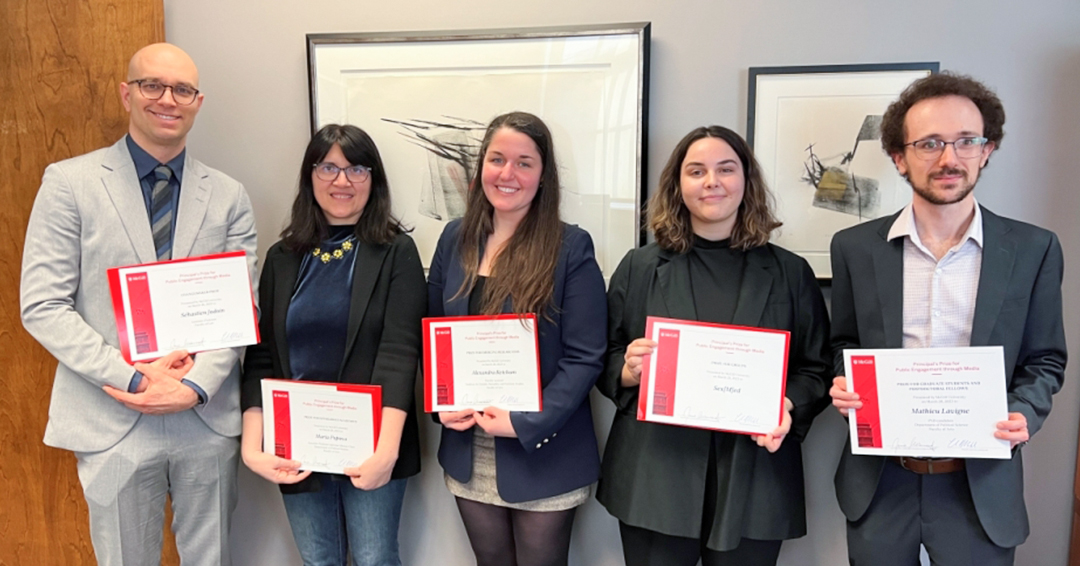
McGill celebrates the winners and runners-up of the 2023 Principal’s Prize for Public Engagement through Media
Whether it’s giving insight into Russia’s war against Ukraine or providing a feminist take on AI, McGill researchers at all stages in their careers are devoting time and energy to fostering understanding, and, in some cases, driving change in society. Now in its seventh year, the Principal’s Prize for Public Engagement through Media gives out awards in each year in four categories: for student groups, graduate students and postdoctoral fellows, early-career researchers, and established faculty members. This year, for the first time, there was representation from 10 of the 11 faculties in the University and increasing numbers of applicants shared information with media, policy makers and members of the public in both official languages.
From sex education
The winner of the Prize for Groups is Sex[M]ed, a group that provides sexual health education, with the goal of combating inequities for women and 2SLGBTQIA+ community members. Their site, which draws 5,000 visitors a month, blends perspectives and information from and for medical practitioners with personal insights on topics ranging from abortion to contraceptive approaches for 2SLGBTQIA+ patients, among others.
The runners-up in this category this year are Canadian Advisory of Women Immigrants (CAWI), DIALOG, and STEMM Diversity.
To online misinformation and disinformation
Mathieu Lavigne, a PhD candidate in the Department of Political Science is the winner of the Prize for Graduate Students and Postdoctoral Fellows. In selecting him as the winner, the jury highlighted his use of social and traditional media to share information on the role of misinformation in the Freedom Convoy and both the Ontario and Quebec elections, and his involvement in consultations with Elections Quebec to help develop their strategy to combat misinformation.
As runners-up, the jury chose Wahéhshon Whitebean, a PhD candidate in the Department of Integrated Studies in Education and Catherine Scott, a postdoctoral fellow in the Department of Natural Resource Sciences.
A feminist takes on restaurants and technology
The winner of this year’s Prize for Emerging Researchers is Alexandra Ketchum, Faculty Lecturer at the Institute for Gender, Sexuality, and Feminist Studies. In selecting her as the winner, the jury pointed to her podcasts, books, and public workshops on her research on food, environmental, technological, and gender history.
The runners-up in this category are Kristy Ironside, an Assistant Professor in the Department of History and Classical Studies, and Sabrina Jafralie, a Faculty Lecturer in the Department of Integrated Studies in Education.
The politics of war in Ukraine
Maria Popova, Associate Professor and Jean Monnet Chair in the Department of Political Science is the winner of the Prize for Established Academics. In choosing her as the winner, the jury underlined her extensive presence in local, national, and international media as an expert on the former Soviet Union in the context of Russia’s invasion of Ukraine, as well as her knowledge sharing on Twitter in the run-up to the war.
The jury selected Andrew Gonzalez, Full Professor and Liber Ero Chair in Conservation Biology in the Department of Biology and Donald Vinh, Associate Professor in the Department of Medicine (Division of Infectious Diseases) as runners-up in this category.
Bringing disability into climate change conversations
The Changemaker Prize, for which you cannot apply but must be nominated, is awarded on an occasional basis to individuals whose dedication to sharing their knowledge with the media and the public has had a major impact on society. Sébastien Jodoin, an Associate Professor at the Faculty of Law and Canada Research Chair in Human Rights, Health and the Environment was awarded the Changemaker Prize for his outstanding work with media and governments over the past years, which has drawn attention to the need for disability-inclusive climate action.
